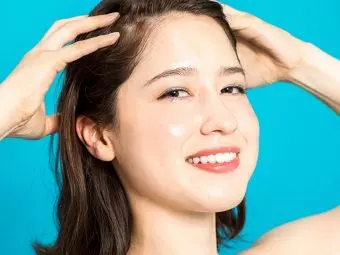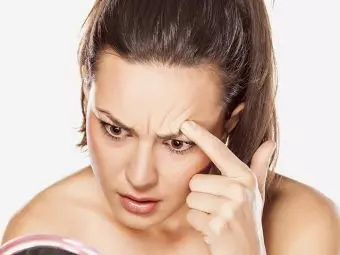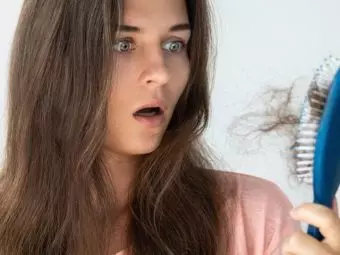Hair loss and weight gain may go hand in hand. The effects of obesity often include fatigue, breathlessness, and knee pain. However, losing your strands is not caused directly by gaining too much weight. Instead, it may have to do with deficiencies or underlying health conditions associated with obesity.
This article explains the possible connection between weight gain and hair loss if you are experiencing both. Take a look.
In This Article
Hair Loss And Weight Gain: What Is The Link?
Excess weight gain and high body mass index (BMI) are associated with multiple health issues and metabolic syndromes that may trigger hair loss. Numerous studies have found a connection between weight gain and hair loss:
- A study on Taiwanese men reported that higher BMI could increase the severity of androgenic alopecia (hair loss) (1).
- Metabolic syndromes like waist circumference and hypertension also trigger female pattern hair loss. A study demonstrated that the severity of pattern baldness increased with weight gain (2).
- A study on middle-aged women concluded that insulin resistance could increase the risk of androgenic alopecia (AGA), especially in women with a family history of AGA (3). Obesity is also one of the causes of insulin resistance (4).
Multiple underlying conditions can trigger unexplained weight gain or vice-versa. This complex process can cause an avalanche of issues, including hair loss. In the next section, we take a deeper dive into the possible causes of sudden weight gain and hair loss.
Causes of Hair Loss And Weight Gain In Women
- Thyroid Disorders
The thyroid gland is responsible for regulating multiple metabolic functions in the body. Imbalance in thyroid hormones is linked to alopecia areata. The hair follicles have receptors that bind to the thyroid-stimulating hormone or TSH.
Studies found that lack of thyroid hormones and hypothyroidism, especially T3 and T4 hormones, could cause hair fall, lack of hair pigments, and other issues. Thyroid disorders are also associated with dry skin, fatigue, and irregular periods (5), (6), (7), (8).
- Reproductive Hormonal Imbalance
The hair cycle in women changes during pregnancy, and diffuse hair loss is common in postpartum women. Although the exact mechanism is not clear, the shifts in the reproductive hormone levels can be one possible reason. It is common to experience hair loss and weight gain during these situations (9). However, the hair cycle normalizes once the hormone levels stabilize.
- Polycystic Ovarian Syndrome (PCOS)
Women with PCOS experience abnormalities in androgen and estrogen metabolism.
Excess estrogen is often linked to both weight gain and hair loss. On the other hand, excess androgen levels or hyperandrogenism also cause female pattern hair loss.
However, the relationship between excess androgen (such as testosterone) and hair loss in women is not clear (10), (11). It is widely speculated that the androgen derivatives (especially DHT) block the hair follicles, causing hair loss.
- Menopause
During menopause, the estrogen and progesterone levels decrease in women. Low progesterone levels often lead to increased androgen levels. This shift in hormones during menopause is responsible for hair loss, mood swings, and weight gain (12).
- Stress
Stressful situations, such as surgery, psychological and emotional stress, crash diet, illness, and injuries, can influence the normal hair cycle and cause telogen effluvium (hair loss) (13). Increased cortisol levels cause redistribution of adipose tissue to the abdominal region, increasing your craving for comfort food. This often leads to abdominal obesity. It also affects your metabolism and causes various metabolic syndromes (14).
- Adrenal Fatigue
Long-term stress activates the adrenal glands and causes adrenal fatigue. These glands regulate adrenaline and cortisol. When they are overworked, they produce more cortisol and cannot keep up with other demands of the body, causing fatigue, sleeplessness, weight gain, low immunity, and hair loss. Animal studies have linked hair loss to increased adrenal activity (15).
The best way to combat this is to take care of your diet and sleeping patterns. Improve your lifestyle through stress management and physical activity to minimize adrenal fatigue.
- Prescription Medications
Prescription medicines like antidepressants, anti-seizure medication, and corticosteroids may cause weight gain and hair loss (16) (17). Hair loss triggered by medications is temporary, and normal hair growth resumes once you stop the medication. Consult a licensed medical practitioner if the hair loss persists.
- Poor Nutrition
Eating unhealthy and processed food and lack of proper nutrition from crash diets can play havoc with your health, leading to weight gain and hair loss. Lack of essential nutrients and trace elements like iron, zinc, fatty acids, vitamins A and E, amino acids, biotin, and protein can cause hair loss (18).
- Prediabetes
Metabolic diseases such as diabetes, blood pressure, heart health, and obesity are all interlinked (19). If you are predisposed to diabetes or any of the conditions, there is a likelihood that you might have an insulin imbalance or high BMI. Insulin resistance can increase your chance of developing androgenic alopecia (3).
To recap, hair loss and weight gain have an indirect connection. Excess weight gain leads to many health issues, such as metabolic disorders and hormonal imbalances, that may result in hair loss. These health issues can be caused due to changes in thyroid functioning, menopause, stress, adrenal fatigue, prescription meds, and unhealthy dietary habits. The silver lining is that there are treatment and medication options available to help curb the hair loss caused by most of these conditions. You should also make healthy changes in your diet, lifestyle, sleep cycle, and stress management techniques to stay healthy.
Key Takeaways
- Studies indicate that excessive gain in weight and a high body mass index (BMI) may lead to androgenic alopecia.
- Lack of thyroid hormones, polycystic ovary syndrome (PCOS), and stress are a few factors that contribute to weight gain and hair loss in women.
- Eating a diet high in processed foods and low in essential nutrients and prescription medications such as antidepressants and corticosteroids have been linked to hair loss and weight gain.
- Keeping yourself physically active, sleeping well, and eating a balanced diet can help you keep your weight under control and stimulate hair growth.
Subscribe
References:
Articles on StyleCraze are backed by verified information from peer-reviewed and academic research papers, reputed organizations, research institutions, and medical associations to ensure accuracy and relevance. Read our editorial policy to learn more.
- Higher body mass index is associated with greater severity of alopecia in men with male-pattern androgenetic alopecia in Taiwan: A cross-sectional study
https://www.jaad.org/article/S0190-9622(13)01031-1/fulltext - Association of metabolic syndrome with female pattern hair loss in women: A casecontrol study
https://onlinelibrary.wiley.com/doi/abs/10.1111/ijd.13303 - Hair Loss, Insulin Resistance, and Heredity in Middle-aged Women. a Population-based Study
https://journals.sagepub.com/doi/abs/10.1097/01.hjr.0000070200.72977.c6 - Obesity and insulin resistance
https://www.ncbi.nlm.nih.gov/pmc/articles/PMC380258/ - Association between Alopecia Areata, Psoriasis Vulgaris, Thyroid Disease, and Metabolic Syndrome
https://www.sciencedirect.com/science/article/pii/S1087002415305384 - Hair Growth and Alopecia in Hypothyroidism
https://jamanetwork.com/journals/jamadermatology/article-abstract/532819 - Human Female Hair Follicles Are a Direct, Nonclassical Target for Thyroid-Stimulating Hormone
https://www.sciencedirect.com/science/article/pii/S0022202X1534330X - Thyroid Hormones Directly Alter Human Hair Follicle Functions: Anagen Prolongation and Stimulation of Both Hair Matrix Keratinocyte Proliferation and Hair Pigmentation
https://academic.oup.com/jcem/article/93/11/4381/2627273?login=true - Effect Of Pregnancy On The Human Hair Cycle
https://core.ac.uk/download/pdf/82326339.pdf - Female Pattern Hair Loss and Androgen Excess: A Report From the Multidisciplinary Androgen Excess and PCOS Committee
https://academic.oup.com/jcem/article/104/7/2875/5342938?login=true - Female pattern alopecia: current perspectives
https://www.ncbi.nlm.nih.gov/pmc/articles/PMC3769411/ - Skin Academy: Hair, skin, hormones and menopause current status/knowledge on the management of hair disorders in menopausal women
https://grimalt.net/wp-content/uploads/2018/06/Blume-Peytavi-hair-hormones-skin-academy.pdf - Telogen Effluvium: A Review
https://www.ncbi.nlm.nih.gov/pmc/articles/PMC4606321/ - Stress and Obesity: Are There More Susceptible Individuals?
https://www.ncbi.nlm.nih.gov/pmc/articles/PMC5958156/ - Development of alopecia areata is associated with higher central and peripheral hypothalamic-pituitary-adrenal tone in the skin graft induced C3H/HeJ mouse model
https://pubmed.ncbi.nlm.nih.gov/19020552/ - Medications that cause weight gain and alternatives in Canada: a narrative review
https://www.ncbi.nlm.nih.gov/pmc/articles/PMC6109660/ - Risk of hair loss with different antidepressants: a comparative retrospective cohort study
https://pubmed.ncbi.nlm.nih.gov/28763345/ - Diet and hair loss: effects of nutrient deficiency and supplement use
https://www.ncbi.nlm.nih.gov/pmc/articles/PMC5315033/ - Diabetes, Hypertension, and Cardiovascular Disease: Clinical Insights and Vascular Mechanisms
https://www.ncbi.nlm.nih.gov/pmc/articles/PMC5953551/
Related
The following two tabs change content below.
- Author
- Reviewer
Annie Jangam
Annie Jangam is a researcher-turned-content writer. She enjoys dissecting complex clinical studies and shuffling through the scientific jargon to make… more
Dr. Usha Kiran
(FRCOG (UK) )Dr. Usha Kiran is a consultant obstetrician and gynecologist at the Prime Hospital, Dubai, specializing in level 3 advanced minimal… more



 How To Use Jamaican Black Castor Oil For Hair Growth
How To Use Jamaican Black Castor Oil For Hair Growth How To Exfoliate Your Scalp At Home To Clear Excess Oil
How To Exfoliate Your Scalp At Home To Clear Excess Oil How To Apply Oil On Hair: A Step-By-Step Guide
How To Apply Oil On Hair: A Step-By-Step Guide How To Use Coconut Oil For Dry Scalp And Dandruff
How To Use Coconut Oil For Dry Scalp And Dandruff Easy Way To Get The Perfect Twist Out On 4C Natural Hair
Easy Way To Get The Perfect Twist Out On 4C Natural Hair Eyebrow Hair Loss: Causes, Prevention Tips, & DIY Methods
Eyebrow Hair Loss: Causes, Prevention Tips, & DIY Methods Types Of Hair Loss, Causes, Treatments, & Prevention Options
Types Of Hair Loss, Causes, Treatments, & Prevention Options Itchy Scalp And Hair Loss: How To Treat And How To Prevent It
Itchy Scalp And Hair Loss: How To Treat And How To Prevent It What Is Hair Texturizing? How To Take Care Of Texturized Hair?
What Is Hair Texturizing? How To Take Care Of Texturized Hair?